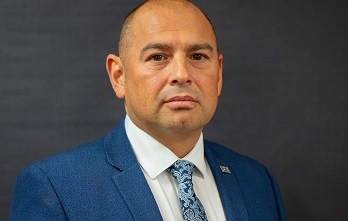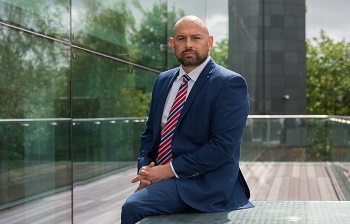
National Vice Chair Ché Donald
PFEW's Vice-Chair Ché Donald spoke to Policing Insight’s Bernard Rix on the impact of the pandemic on policing – from the added strain on officer wellbeing and mental health, to trial by media and increasing diversity.
Officers have faced growing pressures on their own mental health and experienced the bond between police and the public deteriorate as they have become “pawns in this process” of policing coronavirus restrictions, according to Ché Donald, the National Vice-Chair of the Police Federation of England and Wales.
“What we’ve done in the last 18 months has never been faced by any police officer before, so it has caused creaking and straining everywhere within policing.”
Speaking ahead of this week’s Police Federation Virtual Annual Conference, Mr Donald said that the already stressful policing environment – in which one in five officers have experience of complex PTSD – had been exacerbated by the fears and dangers surrounding the pandemic.
And while the situation faced by officers over the past 18 months had been unique, policing under such pressure had been made even more difficult by an often one-sided “trial by media”.
Speaking to CoPaCC Chief Executive Bernard Rix as part of the Policing Friendship Tour, Mr Donald explained: “The theme for conference this year is ‘policing under pressure’, and that probably describes how policing has been over the last 18 months.
“I’m not saying policing hasn’t been under pressure prior to that, but what we’ve done in the last 18 months has never been faced by any police officer before, so it has caused creaking and straining everywhere within policing.”
Weaponising Covid
Mr Donald said a survey carried out two years ago by Cambridge University in collaboration with Police Care UK had highlighted the “startling” statistic that 20% of police officers were either suffering with or had suffered with complex PTSD, because of the “trauma they face on a day-to-day basis”.
“Now couple in the coronavirus and the pandemic; you’ve got officers regularly attending sudden deaths of people who’ve died with coronavirus,” continued Mr Donald. “There’s the additional fear of contracting the virus just through your normal undertaking of your duties and responsibilities – and the fear that, if you contract it, will you give it to your family? Will you give it to your kids?
“You had the threat of people either spitting at you or biting you, saying that they are infected with Covid. So this has all played on officers’ minds.”
“And then you’ve got offenders who have been weaponising Covid. You had the threat of people either spitting at you or biting you, saying that they are infected with Covid. So this has all played on officers’ minds … Mothers have had that fear of sons and daughters. Husbands have had that fear of wives, vice and versa – partners. It’s all around us.”
Policing the legislation had been made even more difficult by late changes to regulations which were only shared with police “moments, literally” before they were announced publicly – or in some cases, made public when “we haven’t been informed about it”.
“Boots on the ground have got to interpret this,” added Mr Donald. “We run the risk of alienating that extremely good relationship and bond that exists between the police and the public by being pawns in this process in policing these coronavirus restrictions.”
Read the article in full at Policing Insight














